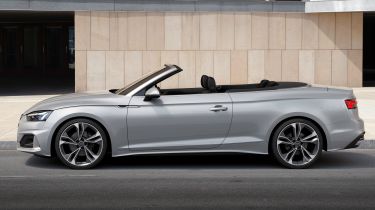Audi A5 Cabriolet - MPG, running costs & CO2 (2017-2022)
Slimmed down engine range promotes low running costs, but warranty could be more generous
Buyers of the Audi A5 Cabriolet must have made it clear that they want their upmarket soft-top to be discreet and affordable to run. Improvements to the Audi A4 range – a model aimed squarely at company-car buyers – have made the A5 a pretty sensible option. Fuel-efficiency is highest on the diesel model, although the petrol options are not as far away as they used to be.
Audi A5 Cabriolet MPG & CO2
All engines now come with a seven-speed automatic gearbox, and the range kicks off with a 148bhp 2.0-litre petrol engine that achieves up to 40.4mpg. CO2 figures for the entry petrol model are 159g/km. This figure is nearly identical for the diesel model, however the 2.0 TDI engine is now limited to the top specification Edition 1 model, which returns up to 46.3mpg.
The emissions figures for both diesel and petrol will mean a high BiK rating no matter which version you choose, putting the A5 in the top bracket for company-car tax. This is a result of the slimmed down range and a shifting tax system which penalises vehicles that aren’t electric or hybrid.
Buyers should also remember that because the A5 Cabriolet range now starts above the £40,000 threshold, it attracts a VED (road tax) surcharge from years two to six. As all models fall into this surcharge, those wanting the more powerful 40 and 45 TFSI models, won’t face as many additional tax costs compared with the 35 TFSI model.
Insurance
Additional risks for insurance companies of having to replace the roof in the event of an accident, and the additional risk of damage from an attempted break-in make the cabriolet slightly more expensive to insure. Grouping starts at 30, instead of 26 for the Coupe, and goes to 33 for the more powerful petrol models. This is inline with the BMW 4 Series Convertible; the BMW 420i SE Convertible starting in group 30.
Servicing
All Audi models require regular servicing, with the option of yearly servicing for motorists who cover fewer than 10,000 miles a year, or variable for higher-mileage motorists. On the latter scheme, oil changes will be no less frequent than every 19,000 miles. Your dealer will advise you as to the right service schedule for you and will be happy to arrange a service plan to help spread the cost of regular servicing.
Warranty
All Audis come with a warranty for three years/60,000 miles, although you can extend this to a four-year/75,000-mile or five-year/90,000-mile policy at extra cost. We feel that Audi’s standard warranty offer is rather less than generous – Mercedes and BMW both have no mileage limit on their warranties and non-premium companies are often more generous – Hyundai offers a five-year/unlimited-mileage warranty with every new car, for example.












